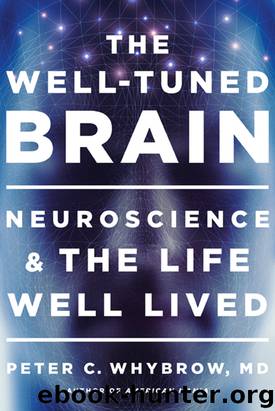The Well-Tuned Brain by Peter C. Whybrow

Author:Peter C. Whybrow
Language: eng
Format: epub
Publisher: W. W. Norton & Company
IDEALLY, FORMAL EDUCATION is an extension of early parenting. It is a process that should harness the young student’s maturational drive to forge and hone the adaptive skills that will serve lifelong autonomy and self-directed growth. We describe this collection of skills for resilience, empathic understanding, self-control, and prudent planning as character, from the Greek word charaktêr, meaning “mark,” as in the markings of a coin. Hence in common parlance character implies the distinctive behavioral marks of an individual—a person’s qualities and habits that are stable and that define his or her behavior within a social context.
Marks of character are commonly labeled “good” or “bad,” with these labels becoming the basis for others’ “moral” judgment of that person. There is substantial agreement regarding the cross-cultural consistency of how such judgments emerge, a subject known as intuitive ethics. In close parallel is the concept of virtue. Thus the virtue of compassion is a reflection of empathic understanding; the capacity to defer gratification is the virtue of prudence; the skills of attentive concentration and dedication to a task translate into the virtue of perseverance; and a balanced ability to manage life’s vicissitudes is the virtue of self-command.
These are the skills of self-tuning that enable each of us to flourish in society—intuitive habits of mind that foster the individual talent of being a good teacher, a responsible citizen, or a fine craftsman. Rather than being fixed in quality, these intuitive skills provide the practical, everyday wisdom that underpins tranquillity and well-being, the quality of mind that in the Greek language is called ataraxia. These too are the skills of resilience, interaction, and caring that sustain the common courtesies—the social manners—that facilitate everyday living. It is the quality of these social skills and how we employ them that determine whether the culture in which we participate is enhanced or degraded. In short, individual character is the backbone of vibrant human society.
The development of character in the young is a collective enterprise. As has been evident in my discussion, in the first few years the burdens and the opportunities of the effort fall disproportionately on parents and family. But the execution of these responsibilities is intimately entwined with the commitments that the rest of us make in the structural and cultural supports provided to young households. For example, while in 2011 almost 60 percent of American women were working outside the home, the United States is one of the few rich countries that do not require paid maternity leave. And yet most of us are aware of the importance of fostering a healthy and stable attachment between parent and infant child, recognizing that nurturing the first steps on the maturational ladder is an investment in the future.
On the other hand, as a culture we seem entirely comfortable with the commercialization of children’s lives from the earliest age. The typical American toddler can recognize the logos of its favorite foods by eighteen months of age, usually from watching television programs, and will ask for them consistently by the third year.
Download
This site does not store any files on its server. We only index and link to content provided by other sites. Please contact the content providers to delete copyright contents if any and email us, we'll remove relevant links or contents immediately.
Periodization Training for Sports by Tudor Bompa(8215)
Why We Sleep: Unlocking the Power of Sleep and Dreams by Matthew Walker(6659)
Paper Towns by Green John(5141)
The Immortal Life of Henrietta Lacks by Rebecca Skloot(4552)
The Sports Rules Book by Human Kinetics(4348)
Dynamic Alignment Through Imagery by Eric Franklin(4179)
ACSM's Complete Guide to Fitness & Health by ACSM(4021)
Kaplan MCAT Organic Chemistry Review: Created for MCAT 2015 (Kaplan Test Prep) by Kaplan(3972)
Introduction to Kinesiology by Shirl J. Hoffman(3744)
Livewired by David Eagleman(3730)
The Death of the Heart by Elizabeth Bowen(3580)
The River of Consciousness by Oliver Sacks(3574)
Alchemy and Alchemists by C. J. S. Thompson(3484)
Bad Pharma by Ben Goldacre(3397)
Descartes' Error by Antonio Damasio(3250)
The Emperor of All Maladies: A Biography of Cancer by Siddhartha Mukherjee(3114)
The Gene: An Intimate History by Siddhartha Mukherjee(3075)
The Fate of Rome: Climate, Disease, and the End of an Empire (The Princeton History of the Ancient World) by Kyle Harper(3035)
Kaplan MCAT Behavioral Sciences Review: Created for MCAT 2015 (Kaplan Test Prep) by Kaplan(2960)
